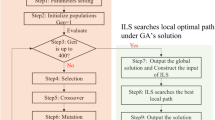Abstract
Aiming at the existing problems with GA (genetic algorithm) for solving a flexible job-shop scheduling problem (FJSP), such as description model disunity, complicated coding and decoding methods, a FJSP solution method based on GA is proposed in this paper, and job-shop scheduling problem (JSP) with partial flexibility and JIT (just-in-time) request is transformed into a general FJSP. Moreover, a unified mathematical model is given. Through the improvement of coding rules, decoding algorithm, crossover and mutation operators, the modified GA’s convergence and search efficiency have been enhanced. The example analysis proves the proposed methods can make FJSP converge to the optimal solution steadily, exactly, and efficiently.
Similar content being viewed by others
References
J. Blazewicz, G. Finke and G. Haopt, New trends in machine scheduling, European Journal of Operational Research, 37 (1988) 303–317.
M. Mastrolilli and L. M. Gambardella, Effective neighbourhood functions for the flexible job shop problem, Journal of Scheduling, 3(1) (1996) 3–20.
P. Brandimarte, Routing and scheduling in a flexible job shop by tabu search, Annals of Operations Research, 41 (1993) 157–83.
H. P. Zhang and M. Gen, Multistage-based genetic algorithm for flexible job-shop scheduling problem, Complexity International, 11 (2005) 223–232.
J. Gao, M. Gen, L. Y. Sun and X. H. Zhao, A hybrid of genetic algorithm and bottleneck shifting for multiobjective flexible job shop scheduling problems, Computers & Industrial Engineering, 53 (2007) 149–162.
G. H. Zhang, X. Y. Shao, P. G. Li and L. Gao, An effective hybrid particle swarm optimization algorithm for multiobjective flexible job-shop scheduling problem, Computers & Industrial Engineering 56 (2009) 1309–1318.
J. A. Paulli, Hierarchical approach for the FMS scheduling problem, European Journal of Operational Research 86(1) (1995) 32–42.
J. W. Barnes and J. B. Chambers, Flexible Job Shop Scheduling by tabu search. Graduate program in operations research and industrial engineering, Technical Report ORP 9609, University of Texas, Austin, 1996. _http://www.cs.utexas.edu/users/jbc/_.
R. J. M. Vaessens, E. H. L. Aarts and J. K. Lenstra, Job Shop Scheduling by local search, COSOR Memorandum 94-05, Eindhoven University, 1994.
S. Dauzére-Pérés and J. Paulli, An integrated approach for modeling and solving the general multiprocessor job-shop scheduling problem using tabu search, Annals of Operations Research, 70 (1997) 281–306.
J. Hurink, B. Jurish and M. Thole, Tabu search for the job shop scheduling problem with multi-purpose machines, OR-Spektrum 15 (1994) 205–15.
H. Chen, J. Ihlow and C. A. Lehmann, Genetic algorithm for flexible Job-shop scheduling, IEEE international conference on robotics and automation, Detroit (1999) 1120–1128.
H. Z. Jia, A. Y. C. Nee, J. Y. H. Fuh and Y. F. Zhang, A modified genetic algorithm for distributed scheduling problems, International Journal of Intelligent Manufacturing, 14 (2003) 351–362.
N. B. Ho and J. C. Tay, GENACE: an efficient cultural algorithm for solving the Flexible Job-Shop Problem, IEEE international conference on robotics and automation (2004) 1759–1766.
I. Kacem, S. Hammadi and P. Borne, Approach by localization and multiobjective evolutionary optimization for flexible job-shop scheduling problems, IEEE Transactions on Systems, Man, and Cybernetics, Part C, 32(1) (2002) 1–13.
I. Kacem, S. Hammadi and P. Borne, Pareto-optimality Approach for Flexible Job — shop Scheduling Problems, Hybridization of Evolutionary Algorithms and Fuzzy Logic, Mathematics and Computers in Simulation, 60(2) (2002) 245–276.
F. Pezzella, G. Morganti and G. Ciaschetti, A genetic algorithm for the Flexible Job-shop Scheduling Problem, Computers & Operations Research, 35 (2008) 3202–3212.
K. Yuan and J. Y. Zhu, Improved Genetic Algorithm for the Flexible Job — shop Scheduling with Multi-object, China Mechanical Engineering, 18(12) (2007) 156–160.
C. Y. Zhang, Y. Q. Rao, P. G. Li and X. Y. Shao, Bi-level genetic algorithm for the flexible job-shop scheduling problem, Chinese Journal of Mechanical Engineering, 43(4) (2007) 119–124.
Author information
Authors and Affiliations
Corresponding author
Additional information
This paper was recommended for publication in revised form by Associate Editor Kim, Dae-Eun
Wei Sun, born in 1967, is currently a professor and a PhD candidate supervisor in the School of Mechanical and Engineering, Dalian University of Technology, China. His main research interests include production scheduling, CIMS and optimization of complex mechanical equipment, mechanical transmission and structure CAD/CAE, management of product design resource and process.
Ying Pan is currently a PhD candidate in the School of Mechanical and Engineering, Dalian University of Technology, China. Meanwhile, she serves as a lecturer in Mechanical Engineering Institute, Dalian Fisheries University, China. Her research interests include production scheduling, production engineering, manufacturing execution system and multi-agent system.
X iaohong Lu is currently a postdoctoral in the School of Mechanical and Engineering, Dalian University of Technology, China. Her main research interests include production scheduling, CIMS, production engineering, mechanical transmission and structure CAD/CAE, management of product design resource and process.
Qinyi Ma is currently a PhD candidate in School of Mechanical and Engineering, Dalian University of Technology, China. Her research interests focus on knowledge-based product digital design.
Rights and permissions
About this article
Cite this article
Sun, W., Pan, Y., Lu, X. et al. Research on flexible job-shop scheduling problem based on a modified genetic algorithm. J Mech Sci Technol 24, 2119–2125 (2010). https://doi.org/10.1007/s12206-010-0526-x
Received:
Revised:
Accepted:
Published:
Issue Date:
DOI: https://doi.org/10.1007/s12206-010-0526-x




